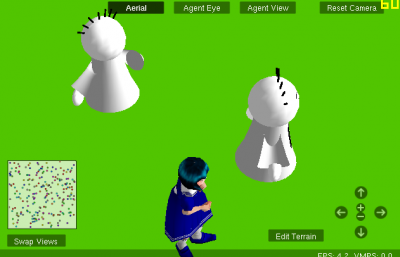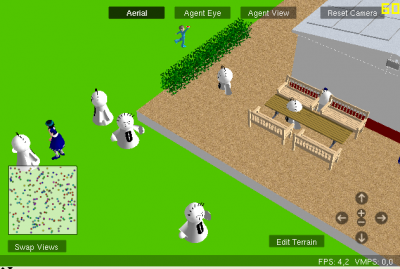Цифровая экосистема
(→Ссылки, литература) |
(→Ссылки, литература) |
||
| Строка 89: | Строка 89: | ||
* Papaioannou, Theo; Wield, David and Chataway, Joanna (2009). Knowledge ecologies and ecosystems? An empirically grounded reflection on recent developments in innovation systems theory. Environment and Planning C: Government and Policy, 27(2), pp. 319–339 | * Papaioannou, Theo; Wield, David and Chataway, Joanna (2009). Knowledge ecologies and ecosystems? An empirically grounded reflection on recent developments in innovation systems theory. Environment and Planning C: Government and Policy, 27(2), pp. 319–339 | ||
** Recent academic and policy debate on innovation indicates that there has been some shift from a more traditional systems approach to ecologies and ecosystems. The latter are concepts transferred from the world of biology to the social world in order to explain the evolutionary nature of interrelations between different individuals, their innovative activities, and their environment. We evaluate the concept of knowledge ecology and the theory of innovation ecosystem on two fundamental grounds; firstly, on the grounds of theoretical plausibility and conceptual consistency; secondly, on empirical grounds of the case of public-private interrelations of biotech innovation in Cambridge. The argument is that the concept of knowledge ecology and the theory of innovation ecosystems can lead to problems of reductionism and functionalism. This is due to their development in abstraction from more grounded analysis of historical processes of the social division of labour. Knowledge and innovation need to be looked at in the context of historically founded processes of socioeconomic development. | ** Recent academic and policy debate on innovation indicates that there has been some shift from a more traditional systems approach to ecologies and ecosystems. The latter are concepts transferred from the world of biology to the social world in order to explain the evolutionary nature of interrelations between different individuals, their innovative activities, and their environment. We evaluate the concept of knowledge ecology and the theory of innovation ecosystem on two fundamental grounds; firstly, on the grounds of theoretical plausibility and conceptual consistency; secondly, on empirical grounds of the case of public-private interrelations of biotech innovation in Cambridge. The argument is that the concept of knowledge ecology and the theory of innovation ecosystems can lead to problems of reductionism and functionalism. This is due to their development in abstraction from more grounded analysis of historical processes of the social division of labour. Knowledge and innovation need to be looked at in the context of historically founded processes of socioeconomic development. | ||
| − | * | + | * Rick, Jochen (2009). Towards a classroom ecology of devices: Interfaces for collaborative scripts. In: Workshop Proceedings of 8th International Conference on Computer Supported Collaborative Learning (CSCL2009): "Scripted vs. Free CS collaboration: alternatives and paths for adaptable and flexible CS scripted collaboration", 8-13 June 2009, Rhodes, Greece http://oro.open.ac.uk/19511/1/dt%2Dcscl2009.pdf |
| + | |||
| + | |||
[[Категория:Цифровая экология]] | [[Категория:Цифровая экология]] | ||
Версия 17:33, 13 февраля 2011
Содержание |
Определение
Цифровая экосистема - метафора, которая предлагает рассматривать современные организации как смешанные сообщества и экосистемы, в которых взаимодействуют люди и цифровые агенты. Продолжение темы построения мирового разума и расширения человеческих возможностей - расширение ноосферы за счет цифровых хранилищ и цифровых агентов, которые помогают людям разбираться с этими цифровыми хранилищами.
История метафоры
Кто про это думал и писал:
- Бергсон, Вернадский, Тейяр де Шарден, Лотман
- Бейтсон
- Турчин и за ним Хейлиген + http://pespmc1.vub.ac.be/ - суперорганизм
- Энгельбарт и все движение дополненной реальности расширенная реальность -предполагает, что мы действуем вместе с агентами.
- Вельтман
Метафора экосистемы в бизнесе
- Сенге - обучающаяся организация у него, особенно во втором переработанном издании рассматривается все чаще не как механическая система, а как адаптивная, живая система
- Ари де Гиус - Живая компания - Giuz Arie de - The Living Company
Метафора экосистемы в образовании
В условиях мобильного обучения и повсеместного присутствия цифровых устройств и агентов школа, как всякая современная обучающаяся организация становится цифровой экосистемой. При анализе возможностей и жизнеспособности организации следует оценивать не компетенции отдельных участников, а совокупные компетенции всей системы. При этом в состав такой организации входят не только ее люди, но и инфраструктура - техника и сервисы, поддерживающие совместную деятельность. Объектом для анализа организации как экосистемы или сети может служить вики организации.
Вики как экосистема
Вики как раз и есть такая электронная модель организации, которая позволяет проследить и понять то, как все устроено и как все развивается внутри организации. Можно представлять себе вики и использовать ее таким образом, что на основании этой сетевой структуры можно будет судить о тем компетенциях, ресурсах и направлениях развития, которые есть у организации. Для вики возможно проследить рост составляющих и поддерживающих ее объектов, агентов и сервисов, а так же увидеть и оценить связи, которые создаются внутри системы.
Цифровая экосистема в картинках
Цифровая экосистема и другой близкий и часто используемый в литературе термин - digital ecology - по содержанию это не цифровая экология, а именно сложная система, которая включает в свой состав различные типы агентов. И агентом может быть человек, может быть робот, может быть программа

- такой трехмерный образ искусственного цифрового агента

- поле, на котором встречаются люди и программные агенты.

Общий ландшафт - среда обучения, которая предполагает, что образуются сети из агентов и объектов.
Цифровая экосистема как граф
Нас тут пока интересует только то, что в результате простых действий участники формируют сеть отношений. При этом в такую сеть входят агенты разного типа - как люди, так и цифровые агенты.
Биграф агентов и объектов

Близкие понятия:
- Цифровая экология
- Быть человеком в цифровую эпоху
- Краудсорсинг
Ссылки, литература
- http://en.wikipedia.org/wiki/Digital_ecology
- http://www.mirainternational.com/books/difference/index.htm
- Глава The Living Organization
- Corrigan, Ray (2009). Ecology, intellectual property and a five point plan for a sustainable public domain? In: 4th GikII International Workshop on Law, Technology and Culture, 18-19 Sept 2009, Institute for Information Law, University of Amsterdam. http://oro.open.ac.uk/18532/1/GikiiIV_5_pt_plan.pdf
- Papaioannou, Theo; Wield, David and Chataway, Joanna (2009). Knowledge ecologies and ecosystems? An empirically grounded reflection on recent developments in innovation systems theory. Environment and Planning C: Government and Policy, 27(2), pp. 319–339
- Recent academic and policy debate on innovation indicates that there has been some shift from a more traditional systems approach to ecologies and ecosystems. The latter are concepts transferred from the world of biology to the social world in order to explain the evolutionary nature of interrelations between different individuals, their innovative activities, and their environment. We evaluate the concept of knowledge ecology and the theory of innovation ecosystem on two fundamental grounds; firstly, on the grounds of theoretical plausibility and conceptual consistency; secondly, on empirical grounds of the case of public-private interrelations of biotech innovation in Cambridge. The argument is that the concept of knowledge ecology and the theory of innovation ecosystems can lead to problems of reductionism and functionalism. This is due to their development in abstraction from more grounded analysis of historical processes of the social division of labour. Knowledge and innovation need to be looked at in the context of historically founded processes of socioeconomic development.
- Rick, Jochen (2009). Towards a classroom ecology of devices: Interfaces for collaborative scripts. In: Workshop Proceedings of 8th International Conference on Computer Supported Collaborative Learning (CSCL2009): "Scripted vs. Free CS collaboration: alternatives and paths for adaptable and flexible CS scripted collaboration", 8-13 June 2009, Rhodes, Greece http://oro.open.ac.uk/19511/1/dt%2Dcscl2009.pdf
